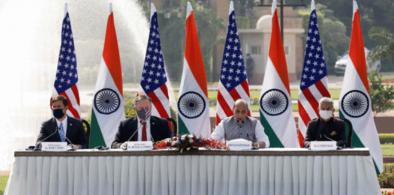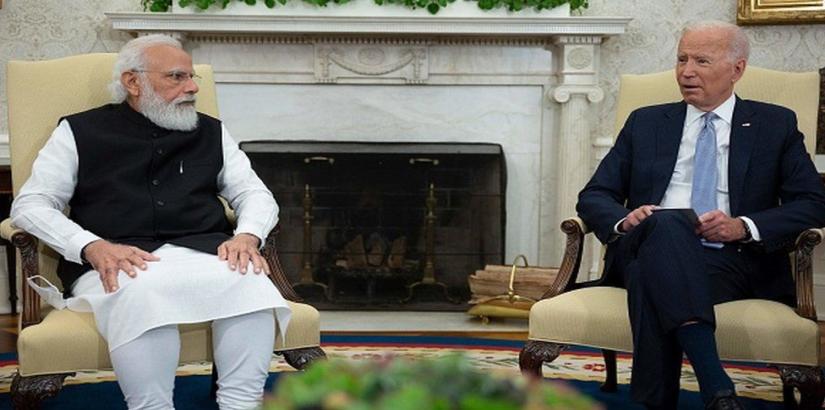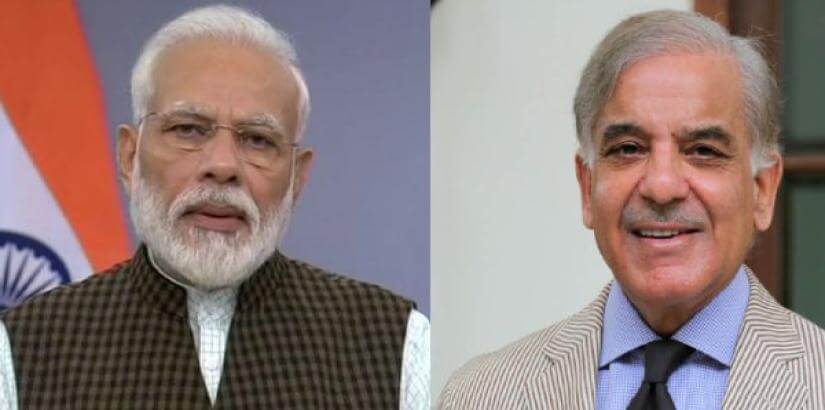Lt Gen Prakash Katoch (retd)
The first phase of the 24th edition of Malabar naval exercise (November 3-6) involving navies of India, Japan, the US, and Australia (four nations comprising the Quad) is underway in the Bay of Bengal focusing on anti-submarine warfare and other combat maneuvers on high seas. Phase-II (November 17-20) will be held in the Arabian Sea with both the US and India likely to deploy one aircraft carrier each adding muscle to multiple maneuvers like surface, anti-submarine and anti-air warfare operations.
This time navies of all four Quad members are jointly exercising; Australia having rejoined after participating in Malabar in 2007 and thereafter opting out because of adverse Chinese reaction.
In Phase-I of Malabar exercise, the US, Australia, and Japan, have fielded guided-missile destroyer USS John S McCain, long-range frigate HMAS Ballarat and destroyer JS Onami respectively while India has deployed the destroyer INS Ranvijay, stealth frigate INS Shivalik, offshore patrol vessel INS Sukanya, fleet support ship INS Shakti and submarine INS Sindhuraj. Just before the commencement of the Malabar naval exercise, the Indian Navy undertook live firing drills at sea.
After 13 years, Australia joins Malabar exercise
Linda Reynolds, Australia’s Defense Minister, on November 3, said, “Participation in sophisticated exercises like Malabar not only highlights the strategic trust among the members, but also strengthens our collective ability to contribute to regional security.” China has been bombarding Australia with sanctions ever since Australia demanded an international investigation into the origins of the virus, how it spread and its handling by Beijing.
As of October 30, 2020, the virus has killed 1.21 million people and infected 47.3 million worldwide, ruining economies of multiple countries in its wake.
China’s increasing aggression
Through the just concluded 5th plenary of the 19th Central Committee of the Communist Party of China (CPC) held from October 26-29, Chinese President Xi Jinping has bestowed more powers on himself by getting his Vision 2035 approved and introducing new working norms for the Central Committee. The plenary mentioned China’s great achievements over the past five years, but actually showed how the Asian giant under Xi has fared: the coronavirus that originated from China has wreaked havoc in the world; increased genocide in Tibet and Xinjiang; the ruthless suppression of democratic movement in Hong Kong; aggressive moves against Taiwan and in Indo-Pacific; promoting terrorism through proxies, and; aggression against India in Ladakh. And aside from all this, Xi’s autocratic reign against Chinese people through intimidation, disappearances and killings.
The CPC has virtually given a free hand to Xi for steering China into dominating the world in the manner he wants. This is a dangerous development for the sane world. It is one reason why Germany has declared it will send a warship to patrol the Indian Ocean beginning next year – joining the effort for a fair and free Indo-Pacific and keeping the global commons free from Chinese interference. China can be expected to become more and more aggressive as its comprehensive national power increases, especially its military power at sea.
Xi could adopt multiple means to realize his China dream by dropping all pretenses of China’s peaceful rise but generally retaining his outward composure. One can recall Xi thundering during his visit to Nepal in October 2019 that anyone attempting to “split” China will be “crushed.” Yet Xi believes all territories under the sun belong to China as he wages hybrid war to break countries and makes fresh illegal claims every second day.
An inclusive Indo-Pacific
Both the Quad and Malabar exercises rest on shared values and commitment to an open, inclusive Indo-Pacific and a rules-based international order. But it is the rise of China and Xi that has forced the world to sit up and take note. US Deputy Secretary of State Stephen E Biegun said on October 20 that Quad should be “more regularized,” and at some point “formalized” with the passage of time. That should be viewed in the backdrop of Xi’s plans to steamroll his way into global domination at top speed especially since he views that the US is in decline and also would like to gain from the electoral chaos in America.
His recent outburst against emperor of the Mongol Empire Genghis Khan indicates he abhors Khan’s notoriety and possibly fears Mongol DNA in Han Chinese who he perceives as a superior race – much like Hitler viewed the Nazis.
In response to the ongoing Quad’s Malabar exercise, China has stated it hopes “the actions by the relevant countries will be conducive to regional peace and stability, rather than the opposite.” But does “peace and stability” figure in the lexicon of the CPC and Xi? It would be prudent for Quad to organize itself as a coherent force in an early timeframe to counter the increasing Chinese aggressiveness. Quad members already have mutual logistics support arrangements.
To begin with, Japan and Australia should post liaison officers (LO) at the Fusion Centre for the Indian Ocean Region (IFC-IOR) established by India and America’s NAVCENT (United States Naval Forces Central Command) in Bahrain. Indian LO should be similarly positioned in Japan and Australia.
The Quad should take a cue from the China-sponsored Shanghai Corporation Organization (SCO) and the Russia-led Collective Security Treaty Organization (CSTO). It is significant to note that even though China’s actions in Central Asia continued to dilute Russian influence, both SCO and CSTO staked out complimentary rather than competing mandates even before China and Russia came closer because of the US sanctions. The primary office of the Quad could be built upon the IFC-IOR or as an exclusive secretariat in Andaman and Nicobar Islands that straddles the western opening of the Straits of Malacca.
As important is widening the Quad with nations of European Union, Asia-Pacific, and South and West Asia joining of their own free will. Quad needs to speedily transform into Indo-Pacific Collective Freedom Organization (IPCFO). South Asia Monitor







